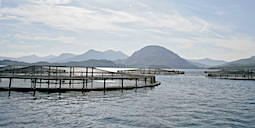The Scottish Environment Protection Agency (SEPA) said on Monday it will “fully investigate suggestions of alleged industry wrongdoing” by BBC programme Panorama about Scotland’s salmon farming industry.
The BBC programme reported possible misreporting of chemical use and said farmed salmon are treated with chemicals to ward off disease and infestations such as sea lice.
It said concerns have been raised that the chemicals, as well as faeces and food waste coming from salmon in fish farm nets, could be damaging the environment in some of Scotland’s lochs.
A recent economic impact report carried out for the Scottish Salmon Producers’ Organisation (SSPO) by 4-consulting showed the salmon farming industry in Scotland has reached a turnover of more than £1 billion and pays an average wage of £34,000.
SEPA CEO Terry A’Hearn said: “Whilst a high quality environment and abundant freshwater resources are vital to Scotland’s aquaculture sector, it’s an industry that attracts polarised positions, from those who cite its economic contribution to those who oppose its existence.
“As one of a number of organisations regulating finfish aquaculture, SEPA is clear that our job is to make sure environmental standards protect the marine environment for the people of Scotland and we make sure the industry meets those.
“That’s unequivocally our focus.
“Consequently across the last twenty-two months we’ve done more science, more analysis and more listening than ever before.
“We announced enhanced environmental monitoring and the creation of new SEPA enforcement unit to ensure compliance is non-negotiable.
“Officers are currently engaged in a programme of unannounced visits to confirm compliance with regulatory requirements.
“As an organisation based on law and evidence, SEPA routinely reviews data from operators, from SEPA monitoring and from third parties.
“Whilst it would be inappropriate to pre-judge potential outcomes, SEPA will fully investigate suggestions of alleged industry wrongdoing made by BBC Panorama.
“SEPA is unable to comment further on its current audit and unannounced inspection programme underway at present.”
Meanwhile, the Scottish Salmon Producers Organisation (SSPO) said it fully cooperated with the BBC Panorama investigation.
“Publicity by the BBC around the Panorama broadcast appears to sensationalise the operations of a farming sector raising live animals day to day in natural surroundings and the routine dealings with the environmental regulator that all farmers, regardless of stock, are subject to …” said the SSPO.
“The health and welfare of farmed fish is paramount to Scottish Salmon farmers who are investing heavily in a strategy of prevention over cure.
“Medicinal use in salmon farming has fallen by 49% in the last decade as spending on innovation, natural preventative measures and alternative treatments have grown dramatically.
“However, as in all farming sectors, medicines are used from time to time.
“Withdrawing all access to medicines is not the best way to ensure the highest standards of fish health and welfare.
“It is important that salmon farmers retain the ability to treat fish medicinally if required.”
SSPO CEO Julie Hesketh-Laird said: “Medicine use in all farming, is tightly regulated by the authorities and in our case by the Scottish Environmental Protection Agency.
“We expect all our companies to adhere to the tight rules that are put in place.
“The industry has a great record on medicines and the significant decline in use over the last 10 years resulting from the industry’s strategy of prevention over cure has really paid dividends.”
Hesketh-Laird added “Scottish salmon farmers are strictly monitored and regulated.
“Though building trust in the regulatory regime is important, Scottish salmon farmers consistently strive to go beyond compliance and we are supportive of regular inspections and scrutiny; it’s how we improve as a sector.
“Scottish laws governing aquaculture are some of the strongest in the world and we welcome that – we want customers to be confident in farm reared salmon.”
